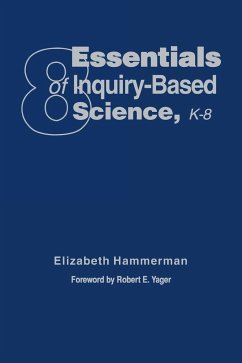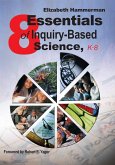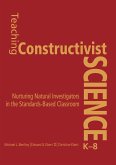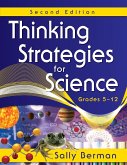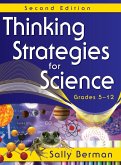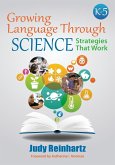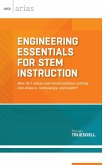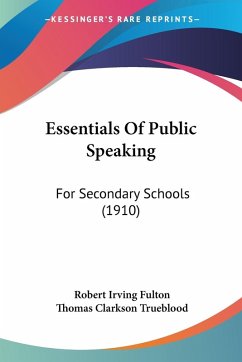Elizabeth Hammerman
Eight Essentials of Inquiry-Based Science, K-8
Elizabeth Hammerman
Eight Essentials of Inquiry-Based Science, K-8
- Gebundenes Buch
- Merkliste
- Auf die Merkliste
- Bewerten Bewerten
- Teilen
- Produkt teilen
- Produkterinnerung
- Produkterinnerung
PLEASE UPDATE SAGE UK AND SAGE INDIA ADDRESSES ON IMPRINT PAGE.
Andere Kunden interessierten sich auch für
![Eight Essentials of Inquiry-Based Science, K-8 Eight Essentials of Inquiry-Based Science, K-8]() Elizabeth HammermanEight Essentials of Inquiry-Based Science, K-840,99 €
Elizabeth HammermanEight Essentials of Inquiry-Based Science, K-840,99 €![Teaching Constructivist Science, K-8 Teaching Constructivist Science, K-8]() Michael L. BentleyTeaching Constructivist Science, K-894,99 €
Michael L. BentleyTeaching Constructivist Science, K-894,99 €![Thinking Strategies for Science, Grades 5-12 Thinking Strategies for Science, Grades 5-12]() Sally BermanThinking Strategies for Science, Grades 5-1235,99 €
Sally BermanThinking Strategies for Science, Grades 5-1235,99 €![Thinking Strategies for Science, Grades 5-12 Thinking Strategies for Science, Grades 5-12]() Sally BermanThinking Strategies for Science, Grades 5-1278,99 €
Sally BermanThinking Strategies for Science, Grades 5-1278,99 €![Growing Language Through Science, K-5 Growing Language Through Science, K-5]() Judy ReinhartzGrowing Language Through Science, K-534,99 €
Judy ReinhartzGrowing Language Through Science, K-534,99 €![Engineering Essentials for Stem Instruction Engineering Essentials for Stem Instruction]() Pamela TruesdellEngineering Essentials for Stem Instruction15,99 €
Pamela TruesdellEngineering Essentials for Stem Instruction15,99 €![Essentials Of Public Speaking Essentials Of Public Speaking]() Robert Irving FultonEssentials Of Public Speaking32,99 €
Robert Irving FultonEssentials Of Public Speaking32,99 €-
-
-
PLEASE UPDATE SAGE UK AND SAGE INDIA ADDRESSES ON IMPRINT PAGE.
Hinweis: Dieser Artikel kann nur an eine deutsche Lieferadresse ausgeliefert werden.
Hinweis: Dieser Artikel kann nur an eine deutsche Lieferadresse ausgeliefert werden.
Produktdetails
- Produktdetails
- Verlag: Corwin
- Seitenzahl: 184
- Erscheinungstermin: 1. Juli 2005
- Englisch
- Abmessung: 260mm x 183mm x 15mm
- Gewicht: 552g
- ISBN-13: 9781412914987
- ISBN-10: 1412914981
- Artikelnr.: 20968299
- Herstellerkennzeichnung
- Books on Demand GmbH
- In de Tarpen 42
- 22848 Norderstedt
- info@bod.de
- 040 53433511
- Verlag: Corwin
- Seitenzahl: 184
- Erscheinungstermin: 1. Juli 2005
- Englisch
- Abmessung: 260mm x 183mm x 15mm
- Gewicht: 552g
- ISBN-13: 9781412914987
- ISBN-10: 1412914981
- Artikelnr.: 20968299
- Herstellerkennzeichnung
- Books on Demand GmbH
- In de Tarpen 42
- 22848 Norderstedt
- info@bod.de
- 040 53433511
Elizabeth Hammerman is a dedicated science educator and consultant. Her professional background includes teaching science at the middle school and high school levels and over 20 years of experience teaching university science education courses and co-directing funded grant projects. She has done extensive professional development with teachers in the field, specializing in curriculum development and implementation, performance assessment, and effective teaching and learning. The need for high-quality professional development programs and materials in science education became apparent throughout the many projects and professional relationships with teachers who were eager to increase their knowledge base, skills, and confidence for teaching science more effectively. Hammerman has co-authored a book on performance assessment in science and authored a database of science assessment tasks. She has published articles, presented programs at national conferences, consulted nationally, and developed curriculum and assessments for cutting-edge school districts and commercial products. Since relocating to North Carolina in 1999, Hammerman has been a math/science consultant for a consortium of seven county school systems, has taught undergraduate and graduate courses in teacher education and science education, served as director of education and professional development for Virtual Learning Systems, and worked as a consultant for the North Carolina Department of Public Instruction. She is actively involved in professional development and continues to work on a series of professional development books for science education for Corwin Press.
Foreword - Robert E. Yager Preface: Improving Student Achievement Through Professional Development Rationale for Professional Development in Science Themes and Threads The Goals of Eight Essentials Using Eight Essentials of Inquiry-Based Science in Study Groups and Professional Development Initiatives An I.D.E.A. Approach The Eight Essentials of Inquiry-Based Science Introduction: Inquiry-Based Science and the Inquiry Classroom Defining Inquiry-Based Science Inquiry as a Process for Learning Teaching Thinking Through Inquiry Teaching Scientific Habits of Mind Through Inquiry Guiding and Facilitating Learning Through Inquiry Implications for the Classroom Using Eight Essentials as Criteria for Assessing Curriculum & Informing Instruction Traditional vs. Inquiry Classroom Behaviors 1. Essential #1: Inquiry-Based Science Develops an Understanding of Basic Concepts Understanding Big Ideas in the Curriculum Standards as Concept Categories Using Standards to Inform Curriculum and Instruction Using Activities to Engage Learners and Promote Inquir 2. Essential #2: Inquiry-Based Science Develops Process and Thinking Skills Science Process Skills Complex Thinking Skills Activities That Develop Skills for Learning and Concept Understanding Guided Inquiry Activities for Upper Primary/Intermediate Level: An Introduction to Metric Measurement and the Structure of Seeds Student Constructed or Guided Inquiry for Intermediate/Middle School Level: Heating and Cooling Rates of Water and Land Guided Inquiry Activity for Intermediate/Middle School Level: Creating Climagraphs Using Visual Organizers to Show Connections 3. Essential #3: Inquiry-Based Science Actively Engages Students in a Learning Cycle Defining a Learning Cycle The Five E
s Lesson Plan Guided Inquiry Lessons Using a Five E
s Format Primary Level: The Ear and Hearing Intermediate Level: It
s All in the Family - A Study of Heredity Analysis of It
s All in the Family Classroom Applications of the Learning Cycle 4. Essential #4: Inquiry-Based Science Builds a Greater Understanding of the Ways That Science-Technology-Society (STS) are Linked Goals of S-T-S Defining S-T-S Technology as Computers and Other AV Equipment Technology as Tools for Learning Technology as Concept Application Technology as Problem-Solving and Inventions Technology as Tools for Learning Environmental Problems and Issues Analysis of a Case Study: Large Numbers of Elk Die in Wyoming Technology as a Production System Applying Technological Design in the Classroom Activities That Engage Students in Problem Solving and Technological Design Using Technological Design to Show Concept Understanding: Understanding Adaptation Building Technology and Technological Design Into the Curriculum 5. Essential #5: Inquiry-Based Science Provides Experiences Necessary to Support and Develop or Modify Interpretations of the World Misconceptions Analyzing Misconceptions Case Study Using Discrepant Events in the Classroom Mediated Learning Experiences Dispositions That Underlie Science 6. Essential #6: Inquiry-Based Science Enhances Reading and Writing Skills Integrating Reading Analyzing Current Events Through Articles Integrating Writing Using Science Notebooks Designing Science Notebooks Using Science Notebooks to Enhance Reading, Writing, Math, and Thinking: Comparing the Strength of Magnets Criteria for Scoring Notebooks Developing Thinking Skills Through Analysis, Creative Writing, and Analogies Analogies Analogies in Science 7. Essential #7: Inquiry-Based Science Allows for a Diversity of Strategies for Learning Analyzing Learning Methods, Strategies, and Best Practices The Creative Use of Strategies 8. Essential #8: Inquiry-Based Science Allows for a Variety of Ways for Students to Show What They Know and Are Able to Do Fundamentals of Assessment Multiple and Varied Assessment 9. Using Eight Essentials to Enhance Learning Eight-Point Lessons Using the Eight Essentials to Analyze Curriculum Materials Resource Strategies for Instruction or Assessment Linked to Multiple Intelligences References Index
s Lesson Plan Guided Inquiry Lessons Using a Five E
s Format Primary Level: The Ear and Hearing Intermediate Level: It
s All in the Family - A Study of Heredity Analysis of It
s All in the Family Classroom Applications of the Learning Cycle 4. Essential #4: Inquiry-Based Science Builds a Greater Understanding of the Ways That Science-Technology-Society (STS) are Linked Goals of S-T-S Defining S-T-S Technology as Computers and Other AV Equipment Technology as Tools for Learning Technology as Concept Application Technology as Problem-Solving and Inventions Technology as Tools for Learning Environmental Problems and Issues Analysis of a Case Study: Large Numbers of Elk Die in Wyoming Technology as a Production System Applying Technological Design in the Classroom Activities That Engage Students in Problem Solving and Technological Design Using Technological Design to Show Concept Understanding: Understanding Adaptation Building Technology and Technological Design Into the Curriculum 5. Essential #5: Inquiry-Based Science Provides Experiences Necessary to Support and Develop or Modify Interpretations of the World Misconceptions Analyzing Misconceptions Case Study Using Discrepant Events in the Classroom Mediated Learning Experiences Dispositions That Underlie Science 6. Essential #6: Inquiry-Based Science Enhances Reading and Writing Skills Integrating Reading Analyzing Current Events Through Articles Integrating Writing Using Science Notebooks Designing Science Notebooks Using Science Notebooks to Enhance Reading, Writing, Math, and Thinking: Comparing the Strength of Magnets Criteria for Scoring Notebooks Developing Thinking Skills Through Analysis, Creative Writing, and Analogies Analogies Analogies in Science 7. Essential #7: Inquiry-Based Science Allows for a Diversity of Strategies for Learning Analyzing Learning Methods, Strategies, and Best Practices The Creative Use of Strategies 8. Essential #8: Inquiry-Based Science Allows for a Variety of Ways for Students to Show What They Know and Are Able to Do Fundamentals of Assessment Multiple and Varied Assessment 9. Using Eight Essentials to Enhance Learning Eight-Point Lessons Using the Eight Essentials to Analyze Curriculum Materials Resource Strategies for Instruction or Assessment Linked to Multiple Intelligences References Index
Foreword - Robert E. Yager Preface: Improving Student Achievement Through Professional Development Rationale for Professional Development in Science Themes and Threads The Goals of Eight Essentials Using Eight Essentials of Inquiry-Based Science in Study Groups and Professional Development Initiatives An I.D.E.A. Approach The Eight Essentials of Inquiry-Based Science Introduction: Inquiry-Based Science and the Inquiry Classroom Defining Inquiry-Based Science Inquiry as a Process for Learning Teaching Thinking Through Inquiry Teaching Scientific Habits of Mind Through Inquiry Guiding and Facilitating Learning Through Inquiry Implications for the Classroom Using Eight Essentials as Criteria for Assessing Curriculum & Informing Instruction Traditional vs. Inquiry Classroom Behaviors 1. Essential #1: Inquiry-Based Science Develops an Understanding of Basic Concepts Understanding Big Ideas in the Curriculum Standards as Concept Categories Using Standards to Inform Curriculum and Instruction Using Activities to Engage Learners and Promote Inquir 2. Essential #2: Inquiry-Based Science Develops Process and Thinking Skills Science Process Skills Complex Thinking Skills Activities That Develop Skills for Learning and Concept Understanding Guided Inquiry Activities for Upper Primary/Intermediate Level: An Introduction to Metric Measurement and the Structure of Seeds Student Constructed or Guided Inquiry for Intermediate/Middle School Level: Heating and Cooling Rates of Water and Land Guided Inquiry Activity for Intermediate/Middle School Level: Creating Climagraphs Using Visual Organizers to Show Connections 3. Essential #3: Inquiry-Based Science Actively Engages Students in a Learning Cycle Defining a Learning Cycle The Five E
s Lesson Plan Guided Inquiry Lessons Using a Five E
s Format Primary Level: The Ear and Hearing Intermediate Level: It
s All in the Family - A Study of Heredity Analysis of It
s All in the Family Classroom Applications of the Learning Cycle 4. Essential #4: Inquiry-Based Science Builds a Greater Understanding of the Ways That Science-Technology-Society (STS) are Linked Goals of S-T-S Defining S-T-S Technology as Computers and Other AV Equipment Technology as Tools for Learning Technology as Concept Application Technology as Problem-Solving and Inventions Technology as Tools for Learning Environmental Problems and Issues Analysis of a Case Study: Large Numbers of Elk Die in Wyoming Technology as a Production System Applying Technological Design in the Classroom Activities That Engage Students in Problem Solving and Technological Design Using Technological Design to Show Concept Understanding: Understanding Adaptation Building Technology and Technological Design Into the Curriculum 5. Essential #5: Inquiry-Based Science Provides Experiences Necessary to Support and Develop or Modify Interpretations of the World Misconceptions Analyzing Misconceptions Case Study Using Discrepant Events in the Classroom Mediated Learning Experiences Dispositions That Underlie Science 6. Essential #6: Inquiry-Based Science Enhances Reading and Writing Skills Integrating Reading Analyzing Current Events Through Articles Integrating Writing Using Science Notebooks Designing Science Notebooks Using Science Notebooks to Enhance Reading, Writing, Math, and Thinking: Comparing the Strength of Magnets Criteria for Scoring Notebooks Developing Thinking Skills Through Analysis, Creative Writing, and Analogies Analogies Analogies in Science 7. Essential #7: Inquiry-Based Science Allows for a Diversity of Strategies for Learning Analyzing Learning Methods, Strategies, and Best Practices The Creative Use of Strategies 8. Essential #8: Inquiry-Based Science Allows for a Variety of Ways for Students to Show What They Know and Are Able to Do Fundamentals of Assessment Multiple and Varied Assessment 9. Using Eight Essentials to Enhance Learning Eight-Point Lessons Using the Eight Essentials to Analyze Curriculum Materials Resource Strategies for Instruction or Assessment Linked to Multiple Intelligences References Index
s Lesson Plan Guided Inquiry Lessons Using a Five E
s Format Primary Level: The Ear and Hearing Intermediate Level: It
s All in the Family - A Study of Heredity Analysis of It
s All in the Family Classroom Applications of the Learning Cycle 4. Essential #4: Inquiry-Based Science Builds a Greater Understanding of the Ways That Science-Technology-Society (STS) are Linked Goals of S-T-S Defining S-T-S Technology as Computers and Other AV Equipment Technology as Tools for Learning Technology as Concept Application Technology as Problem-Solving and Inventions Technology as Tools for Learning Environmental Problems and Issues Analysis of a Case Study: Large Numbers of Elk Die in Wyoming Technology as a Production System Applying Technological Design in the Classroom Activities That Engage Students in Problem Solving and Technological Design Using Technological Design to Show Concept Understanding: Understanding Adaptation Building Technology and Technological Design Into the Curriculum 5. Essential #5: Inquiry-Based Science Provides Experiences Necessary to Support and Develop or Modify Interpretations of the World Misconceptions Analyzing Misconceptions Case Study Using Discrepant Events in the Classroom Mediated Learning Experiences Dispositions That Underlie Science 6. Essential #6: Inquiry-Based Science Enhances Reading and Writing Skills Integrating Reading Analyzing Current Events Through Articles Integrating Writing Using Science Notebooks Designing Science Notebooks Using Science Notebooks to Enhance Reading, Writing, Math, and Thinking: Comparing the Strength of Magnets Criteria for Scoring Notebooks Developing Thinking Skills Through Analysis, Creative Writing, and Analogies Analogies Analogies in Science 7. Essential #7: Inquiry-Based Science Allows for a Diversity of Strategies for Learning Analyzing Learning Methods, Strategies, and Best Practices The Creative Use of Strategies 8. Essential #8: Inquiry-Based Science Allows for a Variety of Ways for Students to Show What They Know and Are Able to Do Fundamentals of Assessment Multiple and Varied Assessment 9. Using Eight Essentials to Enhance Learning Eight-Point Lessons Using the Eight Essentials to Analyze Curriculum Materials Resource Strategies for Instruction or Assessment Linked to Multiple Intelligences References Index

